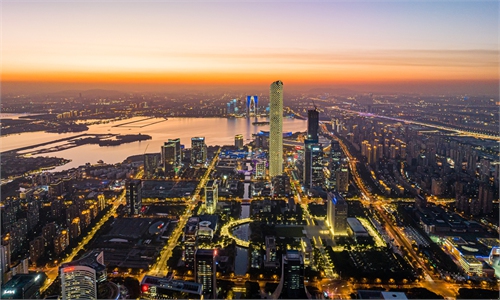Starbucks increases investment in China, vote of confidence in nation's economic future

Starbucks to open its first Greener Store outside of North America in Shanghai Photo:Chen Xia/GT
Starbucks said on Friday that it will establish an innovation and technology center in Shenzhen, South China, which will open next month, with an initial investment of 1.5 billion yuan ($207 million) to enhance its data infrastructure.
China's State Council, the cabinet, announced 24 measures on August 13 to boost foreign investment and expand market access for foreign investors.
Experts said that the move by Starbucks sends a positive signal to multinational companies they should continue to ramp up investment in the huge Chinese market.
"Shenzhen is a hotbed of digital innovation in China and an early demonstration area for the development of the Greater Bay Area. We are excited to work with like-minded local tech talent and entrepreneurs to unlock the infinite possibilities of human connection through technology," said Belinda Wong, chairman and CEO of Starbucks China.
After the innovation center opens, another project of the company - the Starbucks China Coffee Innovation Park - will be put into operation.
"Starbucks has been in Chinese market for 24 years and has never wavered in its confidence in this market," Liu Wenjuan, chief operating officer of Starbucks China said, noting that the firm will maintain long-term investment in China.
Starbucks has more than 6,500 stores scattered in 250 cities in the Chinese mainland, and it plans to operate 9,000 by 2025, covering 300 Chinese cities.
"Starbucks' decision is based on the success of many years of deep cultivation and its growing confidence in the Chinese market," Li Yong, a senior research fellow at the China Association of International Trade, told the Global Times on Sunday.
Multinationals are expanding their research and development (R&D) and advanced manufacturing capabilities in the Chinese market. For example, US chip conglomerate Intel recently opened a new innovation center in Shenzhen, to focus on artificial intelligence, chips development, edge computing and other cutting-edge fields.
In July, French multinational company Schneider Electric completed a third-phase project at its Shanghai plant, an all-new, digital and automated "zero carbon" factory.
On June 29, Merck, a German science and technology company, announced an investment of 70 million euros ($76.3 million) to expand its Life Science Center in Nantong, East China's Jiangsu Province. The expansion will significantly increase production capacity and provide bio-medicine companies with thousands of tons of high-purity reagents for quality control and testing.
Data from China's Ministry of Commerce showed that in the first half of 2023, a total of 24,000 new foreign-invested enterprises were established, up 35.7 percent year-on-year. Actualized foreign investment in high-tech manufacturing sector rose 28.8 percent.
"Continued foreign investment [in China] reflects the difference between the attitudes of foreign investors and Western politicians toward Chinese market, with the former following the economic laws of investment, seeking stability and predictability and a high return on investment, and China is the perfect choice," Li noted.
On August 13, China issued a 24-point guideline to optimize the business environment for foreign investors. The guideline covered six areas, including ensuring national treatment for foreign investment and enhancing protection of foreign investments.
The country has also urged greater support for foreign businesses to set up R&D centers in China and encourage them to participate in major technology projects.
However, some biased Western politicians have politicized economic and trade affairs and imposed restrictions to interfere with normal business management, Li said, noting that the moves are political maneuvers that run counter to the common sense of economics.



